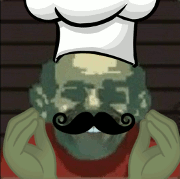|
I’ve got another really stupid question but I just can’t get my head round it. For spells that demand a saving throw, does the caster still need to roll to cast it? The specific spell was Faerie Fire, it’s a dex save to avoid it. Does the Druid need to roll? What if it’s a spell that does damage, and half damage on a save? Does that hit automatically?
|
|
|
|

|
| # ? May 20, 2024 10:06 |
|
Sanford posted:I’ve got another really stupid question but I just can’t get my head round it. For spells that demand a saving throw, does the caster still need to roll to cast it? The specific spell was Faerie Fire, it’s a dex save to avoid it. Does the Druid need to roll? What if it’s a spell that does damage, and half damage on a save? Does that hit automatically? Unless a spell specifies that it makes an attack, you don't need to roll to use it. Compare Ray of Frost and Acid Splash, for example.
|
|
|
|
Sanford posted:I’ve got another really stupid question but I just can’t get my head round it. For spells that demand a saving throw, does the caster still need to roll to cast it? The specific spell was Faerie Fire, it’s a dex save to avoid it. Does the Druid need to roll? What if it’s a spell that does damage, and half damage on a save? Does that hit automatically? The target rolls their saving throw against the caster's DC, the caster doesn't need to roll at all unless specified (say, for damage.)
|
|
|
|
Ah we’ve largely been doing it right then, good. Great examples, thank you. Our Druid was bemoaning that her spell save dc seems really low; automatic hitting with loads of spells explains it.
|
|
|
|
It helps a bit to think of D&D spells in general as being little self-contained rules. Someone says "I cast X" and then you do what the description of Spell X says to do. If it says the caster makes an attack roll, that's what you do. If it doesn't say that, don't. If it says "save for half damage" do that. If it says "save for no damage", do that. If it doesn't mention saves, don't do one. E: people mess parts of this up fairly often, I'm glad you've been getting it right. E2: in case it's not clear, this means a bunch of spells don't require an attack roll and also don't allow a save. It's not an either/or thing, you just do what the spell text says. Elector_Nerdlingen fucked around with this message at 23:23 on Dec 20, 2018 |
|
|
|
Aaah, so the reason we couldn't find a general case in the handbook to apply the spell rules to is because there isn't one; it's literally just what's in the spell description, no more no less. Now that definitely makes things clearer. Thanks.
|
|
|
|
There are general spell rules about targeting, components, slots, etc but there's only something like a page of those and individual spell text can override them anyway. Nothing about "always roll like this to cast" though. It's definitely a safe bet to assume you should just do what the spell description says, looking up anyhing that sounds like a reference to another rule if you need to. Elector_Nerdlingen fucked around with this message at 23:14 on Dec 21, 2018 |
|
|
|
Also, unless I'm forgetting something, you never roll to hit on an aoe effect (not just for spells that are aoe), just the target's reflex save to avoid.
|
|
|
|
Keeshhound posted:Also, unless I'm forgetting something, you never roll to hit on an aoe effect (not just for spells that are aoe), just the target's reflex save to avoid. I think you're right, but I'm also pretty sure that that's not a rule so much as there's just nothing that does it (same with how there aren't effects that require an attack roll and also grant a damage save as far as I know). But even if those are both rules, a future spell could say in the text "Make an individual spell attack against every opponent in a 20' radius circle. On a hit, the target makes a constitution save and takes 2d10 damage on a failed save, or half if the save is successful", and that's what you'd do because spells are single-use rules exceptions. E: poo poo wait, we're talking 5th ed here right? "Reflex save" isn't a thing in 5th and if we're talking 3rd I could be wrong. Elector_Nerdlingen fucked around with this message at 23:34 on Dec 21, 2018 |
|
|
|
Generally the design is such that there's one roll to determine outcome both in 3rd and 5th. That is, you don't want to give a saving throw when there's already an attack roll because that's two chances to miss. There's no attack rolls on AoEs for the same reason. Spells, or anything really, become hot garbage rapidly when you make people roll multiple times to succeed. A save DC of 15 vs a commoner has a 75% chance to succeed. Add a ranged touch attack and that's now using your Dex and you have a 45% chance to succeed followed by a 75% chance to succeed... Now that spell is worse than a coin flip. Versus a commoner. So most spells are designed with that in mind. It might require a ranged touch attack or a saving throw, but not both.
|
|
|
|
Generally speaking I've found it best to think of dice rolls not as chances to succeed, but as chances to fail. Because really, you only ask for a roll when failure is a possibility. So if you make people roll multiple times for the same outcome, you're really just compounding the opportunities they have to fail. Doing that serves only to bone players by making their character design irrelevant; roll enough dice, they will fail. This is made worse by the fact that different rolls require different stats and casters tend to be highly specialized.
|
|
|
|
Rule #1 is pretty much only ask for a roll if failure is interesting, if the game will halt if they fail, then don't make them roll. The lead on 5e doesn't know this and made the party roll to find the adventure for 30 minutes on a prerelease stream so don't worry if this is a revelation.
|
|
|
|
I wasn't saying that you should write a spell that requires an attack roll against AoE targets and then gives them a save. I was saying that notional spell text that said to do exactly that would override a contrary general rule or design conceit because that's what spells in D&D do - provide exceptions and overrides. If you look up the page a bit, I was the one saying "don't make anyone roll more than once to do the thing".
|
|
|
|
Yeah, I was agreeing with you there. Spell text is the deciding thing, but spell texts are normally written with that in mind. It was agreement, not disagreement, sorry if I wasn't clear. Phone posting for the holidays.
|
|
|
|
No worries, and sorry yeah I think you were actually clear. I probably misread you because I'm stressing out about holiday stuff today and also phone posting. I think your "a roll as a chance to fail, not suceed" thing is a really good concise way to put that thought and I'll be using it in future. Elector_Nerdlingen fucked around with this message at 06:08 on Dec 23, 2018 |
|
|
|
AlphaDog posted:No worries, and sorry yeah I think you were actually clear. I probably misread you because I'm stressing out about holiday stuff today and also phone posting. Yeah, it's a useful way of thinking about it.
|
|
|
|
So a GM question about Torchbearer, basically as sombody that picked it up out curiosity hearing of it as a harder,more meticulous DnD like, it's very early in the morning and i'm very tired to be reading up on the rules right now, but skimming through the rules atm and i just think...where do i even start to even beginning to comprehend how this system works and how to apply it? Anybody know where i can find like a video of a session to help me visualize it better?
|
|
|
|
There are some good YouTube videos but I can’t link them well from my phone.
|
|
|
|
The only time I attempted to understand torchbearer I sought out an actual play and....I was not any more enlightened by the end.
|
|
|
|
Torchbearer's great but I'm not gonna try to explain how to torchbearer while I'm phone posting. But take oldschool "4 yokels get in way over their heads while robbing local tomb" D&D and step waaaaaaaay the gently caress back from the mechanics of the game and only look at the story of the 4 idiots who nearly died down in the dark. Instead of thinking about that story in action/adventure terms, think of it as a harrowing survival doco. Zoom back in on the mechanics, and that's torchbearer.
|
|
|
|
This reddit link has a good summary.
|
|
|
|
EthanSteele posted:Rule #1 is pretty much only ask for a roll if failure is interesting, if the game will halt if they fail, then don't make them roll. The lead on 5e doesn't know this and made the party roll to find the adventure for 30 minutes on a prerelease stream so don't worry if this is a revelation. Do you have a link? That sounds hilarious
|
|
|
|
I'm looking for advice on what system to use for what is likely to be a one-shot or at least a very short campaign. I'm wanting to run a super hero campaign, have the city the place is set in be co-created by my players, have the city split into sections, one per player and have them pick a zone type (Like Simcity or Cities Skylines). Each player will also have on super villain/arch nemesis so this team of heroes has an opposing 'team' who are working against each other as much as the heroes. I was then going to take each player to one side, with the pretense of each hero having some dramatic background secret or a secret mission. What I'm actually going to tell them is that they are also their "arch nemesis" and have infiltrated this team to try and guide these heroes away from their plans and machinations and towards the other villains. And I'm going to do the same with every player, so they all think they're the secret villain and are trying to convince these other 'heroes' to go against one or more of the other villains. I think I'm wanting something that leans less heavily on crunch and more on the roleplaying aspect of it all.
|
|
|
|
Luminaflare posted:I'm looking for advice on what system to use for what is likely to be a one-shot or at least a very short campaign. I'm wanting to run a super hero campaign, have the city the place is set in be co-created by my players, have the city split into sections, one per player and have them pick a zone type (Like Simcity or Cities Skylines). Each player will also have on super villain/arch nemesis so this team of heroes has an opposing 'team' who are working against each other as much as the heroes. One of the Apocalypse World spinoffs should do this for you. Worlds in Peril or Masks?
|
|
|
|
I wouldn't reccomend a pbta game (wildly out of character for me) because they don't handle loving around with the premise very well
|
|
|
|
The Shame Boy posted:So a GM question about Torchbearer, basically as sombody that picked it up out curiosity hearing of it as a harder,more meticulous DnD like, it's very early in the morning and i'm very tired to be reading up on the rules right now, but skimming through the rules atm and i just think...where do i even start to even beginning to comprehend how this system works and how to apply it? Anybody know where i can find like a video of a session to help me visualize it better? It's kind of tough to answer a "what even this game" level question, but here goes. Your character has a bunch of different skills and some base stats: Health, Will, and Nature. When you try and do something which tests one of your skills you roll a d6 pool equal to your skill in that thing, half its base stat if there's a skill but you don't have it, or a base stat if this is something like resisting a poison or getting a dungeon ghost out of your head that isn't really a trainable skill. You can always: - sub in Nature for any roll. Nature is how much of a stereotypical human/elf/dwarf/halfling you are. If you sub in Nature for something that isn't stereotypical human/etc behavior and fail, it gets temporarily damaged, or "taxed". - add +1 die (+1d) for a Wise, an area of your expertise that applies to what you're doing. - add +1d for each of your mates who's helping you, either with what you're rolling, with a complementary skill, or with an appropriate wise - add 1 or more dice for appropriate equipment. Usually this uses it up. - burn a Fate Point after the roll to reroll 6s, or with a Wise to reroll any one failure. - burn a Persona Point before the roll to "tap your nature" to add its rating. You will always tax your nature if you fail, and tax by 1 if you succeed outside your stereotype. - burn Persona Points before the roll to add +1d per, or afterward with a Wise to reroll as many dice as you want. - tap a Trait to give you +1d if you haven't used it yet. - mention a Trait to call a penalty on yourself for -1 die, or +2 dice or a tiebreak to your opponent if the roll's opposed. Why the hell would you want to do that last thing? Well, two reasons. First, every skill needs (rating+1) successes and (rating) fails to get better. If you don't fail you'll never improve. Second, calling a penalty on yourself gets you downtime checks, which are basically your only way to resupply in the dungeon - if you can find a safe place to camp, inside or outside, you can spend your checks to cook nutritious meals out of wall fungus or scare up extra supplies or repair your armor; if things have stacked up so it looks like you're going to fail, might as well milk some benefit out of it for later, right? When you're in the dungeon it grinds you down. Every test anyone makes for any reason, including as fallout from other failed tests, will advance the clock, and every four tests a new condition adds to the pile. Hungry and Thirsty is first on, then Exhausted, then things start getting really bad. You don't need to camp to eat and drink - you just need a moment of peace - so as long as you've got the supplies for it and you're not being actively hunted you can keep the worst at bay. Sometimes the DM will decide to zoom in on things. Usually fights, but also chases, big ol' arguments about who gets the most money, riddle contests with dragons, whatever. These are conflicts, which only count for one tick on the grind clock. Each side involved in the conflict says what they want out of it, everybody makes an initial test which adds a skill roll to a stat number for the pool of disposition/"hit points", and then you script out three volleys of RPS against the DM's monsters - Defend blocks Attack, Feint beats Defend, Attack beats Feint, and Maneuver just noodles around making the next roll better for you/worse for the other side. Distribute HP among participants, active roller takes the brunt of the blow, when someone's out of HP they can't contribute to the conflict unless a Defend rallies enough HP to get them back in. At the end of the conflict the two sides compromise on their goals based on how much HP the winning side still has left. The goal of all this almost dying is to take treasure from the dungeon back to town. Town is a more structured safe space than camp is - you can do as much as you want in town, as long as you have the money to pay your bills before you head out, though you start with 0 money and have to rely entirely on dice from selling treasure to pay up. (It's not all bad - as long as you don't care about failing, all your treasure dice basically count double, since coming up short taxes your Resources by the margin of failure, and you weren't holding onto those treasure dice anyway. Of course, if you do succeed, that's enough to give you 1 point in the Resources skill, so maybe...) Anyway, there's plenty more mechanics I didn't talk about there, but is that a sufficient overview or do I need to get BIG?
|
|
|
|
Is there a good conversion of the Chronicles of Riddick setting into an existing tabletop system? I have a weird love for the series and would love to play around with the setting. Ideally I would want an official setting supplement but a quick Google didn't turn up anything.
|
|
|
|
Trojan Kaiju posted:Is there a good conversion of the Chronicles of Riddick setting into an existing tabletop system? I have a weird love for the series and would love to play around with the setting. Ideally I would want an official setting supplement but a quick Google didn't turn up anything. Omg yes, I also want. I'd be curious what you turn up.
|
|
|
|
Any tips for running 5e Curse of Strahd? Gonna start it up here pretty soon.
|
|
|
|
The Shame Boy posted:Any tips for running 5e Curse of Strahd? Gonna start it up here pretty soon. I just finished an irl goon group run of this and it was a total blast. Read the whole thing well, there are a lot of interlocking pieces. Be ready to deal with players not wanting to follow strahds script. Our dm was pretty open about challenge levels but used the various player helpers well. I might page the dm to see if he has thoughts actually, I was playing for once.
|
|
|
|
sebmojo posted:I just finished an irl goon group run of this and it was a total blast. 1) the book goes out of its way to be like "not everything should be grimdark, darkness without context is just boring" and then says "oh yeah none of the Barovians have any souls and they're kinda just half-people." Ignore this second part, and make them human. The best moments all came from when the party were trying to save Barovia, rather than enrich themselves, and those moments wouldn't have happened if I hadn't chucked out the whole no-soul thing. 2) this game is not about the final fight: if they've got the Sun Blade etc, it's a total walk. I had to buff Strahd, give him friends and make them run to the coffin to stake him afterwards just to make it even a little bit challenging. Run it with a focus on preparation etc, rather than a final epic confrontation. 3) Strahd himself is a great antagonist. You can make him very active: he goes out of his way to find the party and gently caress with them. He can show up, KO them all, then walk away laughing. He can show up, kill somebody, then leave without a word. Hell, he can show up and sit there reading a book of poetry and it'll have them in fits. Strahd is present in the campaign like pretty much no other official book antagonist. He's a bitchy goth primadonna who wants attention and will literally kill to get it. Lean in on that: it puts a ticking clock on things, and it makes it genuinely rewarding when they finally wipe the floor with him. 4) be prepared to bend the rules about what perma-kills vampires, so Strahd doesn't get killed when they're at like lvl3. In particular, I cut the radiant damage thing. Sure it made him a lot more powerful, but he needs it. He honestly isn't that tough. They didn't even have a cleric and they were trading blows decently with him at lvl6. 5) prepare rules for what banishment/planar fuckery does. It caught me off-guard—what does happen when you banish somebody from a demiplane? What would happen if you banished Strahd? 6) looping back to 1, prepare to cut down a lot of the grimdark. Some of it is great, but some of it is corny as hell. I just made Rictavio an avuncular professor type and it went way better than His Tragic Quest To Avenge His Loved Ones. The were-ravens were chill and friendly. The mayor of Vallaki genuinely wanted what's best for his town, and worked towards that. It makes the good grimdark stuff really pop.
|
|
|
|
Supplementary: it's not an amazing campaign for combat. It's not bad, but it's definitely more social/investigation focused. There's a lot of combat, but it's pretty easy and a party of munchkins will break it over their knee. I'm definitely not running it with my other group, since they're very gameplay/combat/optimization focused and they wouldn't have any fun with it at all. The only exception to this is the Amber Temple, which is a huge difficulty spike and is easily the scariest place in the book.
|
|
|
|
Torchbearer is rad, its an oldschool dungeon crawler style thing where the people in the party don't matter in the grand scale of things, but you still get attached to these 4 gently caress ups that have no idea what they're in for.Strom Cuzewon posted:Do you have a link? That sounds hilarious I do not, but it was on twitch. It was awful just listening to him go "roll perception, welp, you don't find anything" and then a couple of minutes later asking the party to roll it again over and over and over.
|
|
|
|
Couple thoughts from playing Curse of Strahd to completion myselfSurreptitiousMuffin posted:Hi, this is me. Some thoughts from running the campaign to completion: Yeah, the game has a LOT of NPCs, use them a lot. We had a lot of allies and it helped a lot/was more fun. Even some of the enemies can be negotiated with, which makes things interesting. quote:2) this game is not about the final fight: if they've got the Sun Blade etc, it's a total walk. I had to buff Strahd, give him friends and make them run to the coffin to stake him afterwards just to make it even a little bit challenging. Run it with a focus on preparation etc, rather than a final epic confrontation. I have to disagree with buffing Strahd really; it's easy enough to drive him off but actually killing him involves bashing through a TON of hit points thanks to the crystal heart thing he has (nothing says he can't refill it between fights if there's enough time too), and even if you take him to zero HP he just turns to gas and goes to his coffin for an hour (whereupon he pops up full power when the party... probably isn't). Beating that alone can be a tough trick, especially if the party hasn't found said crypt or worked out how to beat the teleport traps. Also that "messing with the party" thing works great having him strike every so often when people are moving through Barovia; sure our paladin took to taunting Strahd by holding up the number of times he'd had to run off at the end of each fight, but it was a great way to keep him on stage and outside Ravenloft you literally cannot kill him off even if you screw up the encounter. Also Strahd works extremely well if you play him smart; he has a lot of tricks to control the battle. Why have him going toe to toe with the party when he can pull tricks like flying on his nightmare or turning invisible or even just making sure to strike when they aren't prepared. Our DM played him as pulling a lot of hit and run tactics, and he tended to give us fits even if we held our own enough for him to flee. And once he's in Castle Ravenloft proper his ability to screw with PCs just goes insane; even his simple "close/lock doors at will" trick can get ugly when he uses it to split up the party. You should also cheerfully make him cheat like a bastard there; drag people into all the traps he's got scattered around the castle or use minions, he's got tons of both and no reason to "fight fair". Don't try to make him an uber-tough bastard, make him a clever one who controls where and how he fights. His goal is amusement after all; trolling the PCs is pretty much his style really. Also makes the "where to find Strahd" tarot reading far more valuable if he's generally popping up and wrecking havoc seemingly at random; knowing WHERE you can definitely find the bastard is quite useful then. quote:5) prepare rules for what banishment/planar fuckery does. It caught me off-guard—what does happen when you banish somebody from a demiplane? What would happen if you banished Strahd? Honestly a lot of what "lightened up" the module for us was taking the opportunities for black humor the game provided in spades. It was a running joke in our group how we kept walking around Vallaki yelling "All will be well!" through Stepford Smiles. Also was pretty hilarious when we took Strahd's invitation to Ravenloft poking fun at the cliché (we played along because he'd gone to SO much trouble to set the theme, it seemed rude not to indulge him) and got to sit through the "polite threats" dinner (personal favorite was when we teased him about not eating with us and him saying "Oh, I'll be dining... later this evening" As for encounters, the one fight I would be careful of is the hags at the mill; that one is WAY too easy to blunder into at low level and get a TPK. Our DM thankfully made sure to have one of the hags at the village selling their pies so we didn't face them with their full strength (the "three hag coven" spells are just too much), and we still nearly died out. Other benefit of having one of the hags out was a way to foreshadow their existence/the pies, and the last one was quite upset with us killing her sisters and made sure to track us down when we were trying desperately to flee from Castle Ravenloft after our first entry and make our flight QUITE exciting. Amber Temple as mentioned is legitimately scary, but at least that is foreshadowed enough to be fair (anybody dumb enough to think "place where main bad guy got his powers" is a cake walk deserves what will hit them there) and one of the main things is an elf caster who can probably even things out some if the party is careful.
|
|
|
|
quote:I have to disagree with buffing Strahd really; it's easy enough to drive him off but actually killing him involves bashing through a TON of hit points thanks to the crystal heart thing he has (nothing says he can't refill it between fights if there's enough time too), and even if you take him to zero HP he just turns to gas and goes to his coffin for an hour (whereupon he pops up full power when the party... probably isn't). Beating that alone can be a tough trick, especially if the party hasn't found said crypt or worked out how to beat the teleport traps. 1) cancels out his regeneration 2) deals 20 radiant damage to him per turn 3) gives him disadvantage on all attacks 4) if it kills him, he doesn't turn to mist: he just straight-up dies It cannot be overstated the degree to which sunlight and/or radiant damage absolutely ruin his poo poo. Even with the heart up, you could kill him in 10 turns just by standing next to him and letting the sunlight cook his rear end.
|
|
|
|
All of that is true, but why would Stradh hang around for 10 turns in range of the thing and let it cook him? He'd be gone the second it was unsheathed and then he'd sent sombody to steal it from the party later that night or something. Still haven't gotten the game actually started yet but i like the section in the book that mentions if any kind of long range contacting type spell is used then Stradh can make himself be on the other end of the line instead. He is gonna prank the Paladin SO HARD.
|
|
|
|
SurreptitiousMuffin posted:Are you factoring the sunsword into this? Because it: Hmm, like I mentioned I was playing, not running, so can't speak to any changes. Don't know if our DM ran the Sunblade as being actual sunlight (truth be told the radiant damage was nasty enough when we handed it to our smite happy paladin so it would have been hard to notice), that might have been the difference. Of course as mentioned he played Strahd as entirely smart enough to not go toe to toe with said paladin, tended to send minions/charmed PCs/locked doors in his way while Strahd went for the weaker PCs, think the paladin got maybe two or three hits on Strahd total in campaign with it (Strahd tended to flee like mad after one hit). We did play with the holy symbol generating actual sunlight, but since that's limited by charges/time Strahd ran out of the radius the one time we got him with it until the duration expired. His greater invisibility spell was also pretty ugly when it came to actually hitting him in the face until my bard managed to get through the locked door splitting the party and tagged Strahd with faerie fire. Still I guess I do have to revise my statement and say then removing the sunlight effect from the sword (or else make just Strahd resistant to it if you want it to still murder vampire spawn) is fair and just keep that the uber ability of the holy symbol instead which is pretty balanced by the charge/duration limit. Honestly not even unbalanced to remove the "auto perma-die in sunlight" thing and make it stake in the coffin only, it really was the only dramatically appropriate way to finish him. When in doubt, like any good serial villain Strahd should always run away; we only downed him ourselves after a frantic chase through the basement teleporter and some very lucky crits (and drat near missed staking him in that hour because one of our NPC "allies" used how badly we'd been split up by Strahd to execute a nasty betrayal and take Ireena; by the time we recovered from that and managed to make it into the crypt I think I managed to stake him almost literally in the last minute before he woke up). Also keep the pressure up in the castle to prevent any shortened "adventurer days"; Ravenloft was pretty much a no-rest zone for us because there was no way to logically find safety and when we finished we were literally out of all spells/most abilities. The ability of Strahd and several of his undead minions to just walk through walls can do ugly ugly things to "safe" spots (and help with the running away for Strahd if need be). MadDogMike fucked around with this message at 04:56 on Dec 31, 2018 |
|
|
|
Like a lot of antagonists, I feel like Strahd's ability to be a threat is directly proportionate to how smart the DM runs him. A Strahd who will stick around in a straight-up fight and try to duke it out with the PCs will get chumped if the PCs have been following the questlines and getting the proper gear; a Strahd who is played as a tactical genius and does a lot of hit-and-run will chump the PCs if the PCs aren't also sufficiently on the ball. A really smart Strahd run by a DM with perfect knowledge of the PCs' abilities and equipment and who uses the terrain and environs to their maximum advantage is loving gross. None of these options is inherently worse or better than any other (except arguably that last, because that verges on adversarial GMing). It comes down to the kind of game your players will dig. But the key to making Strahd a challenge isn't to worry about buffing his stats, IMHO; it's to play him as the kind of enemy that isn't going to stick around as you start whittling away his HP. He'll just leave and throw a bunch of minions at you while he heals up, he isn't playing by Marquis of Queensberry rules. A party of PCs - more accurately, a group of players - who have basic comprehension of tactical acumen will trivialize a lot of encounters, because there are multiple brains working to out-scheme the DM's single brain, so keeping Strahd threatening requires a bit of pre-planning on the DM's part. Having said that, though, I want to reiterate - ain't nothing wrong with having Strahd get his rear end kicked because he was too dumb to flee, if that's the kind of game your players will enjoy - especially if they can make him too dumb to flee by taunting him or whatever. Every table requires a different approach.
|
|
|
|
Is it just me or are GURPS games intentionally written to obfuscate as much as possible? Like it's crunchy by design but we're talking about "roll under number with 3d6" here, not rocket surgery. And yet every single thing wants me to add up variables from 18 different books. I'm trying to put together a game of Conspiracy X using the GURPS system because it was much cheaper for me to get those sourcebooks than buy 2.0, but was Steve Jackson just super by design mandating buying every book? And then poo poo is all cross referenced like "B19" and I have to divine that this means "page 19 of the basic book that was out at the same time." I mean, piss, if you're gonna publish a new version of the basic book multiple times you should at least make an effort to make sure all the references you seeded in a hundred other books still work by trying to keep the pages the same. Publish an errata or something. This is more of a rant than I intended but I guess if anyone has advice for navigating GURPS from 2003 I'd super appreciate it. The new ConX 2.0 system looks cleaner but they split a lot of the info off into 4 different books rather than one. But gently caress, if I'd known I was gonna need 733 other books to figure out how to roll 3d6 I'd maybe have gone for it. Strongly considering using character creation templates then running it super loose and DM discretion based for everything. The players have no expectations as the system is new to all of us so I might just play it hell of loose like a PbtA game. Progression is based on story stuff and resource management rather than on personal character development or leveling up so it should be pretty trivial to fudge. Is that the Illuminati secret for navigating GURPS? Edit: as I see it the main thing that is crunchy is that characters have a lot of things that they can do but they are all governed by rolls, so the players need to know what they can do and when and have to know their sheet well enough to say things like "oh, can I use this particular pulling strings to address this problem?" And if the players don't know what their characters can do or are good at it breaks down. I understand that it's meant to be played crunchy where players know the hell out of all the bonuses they can use to push a roll up and I am supposed to be lightly adversarial by reading the ways to push the number to roll under lower, but at the same time there's meant to be some discretion in that I can move the target up or down based on the arbitrary "good roleplay" clause (i.e. "what do you say to him?" With modifiers applied based on whether it's persuasive or compelling) so I imagine as long as I'm not looking to gently caress the players confrontationally using some basic statistics to roughly approximate difficulties and letting players use their sheets to make things easier for them (or harder) should work fine. Like the principles of a game are there. And since there are no expectations I know that as long as we have a game and it's fun we're fine, but I just don't want to gently caress the system up badly by being fudgy so if there's some grand secret out there other than "use your DM instincts" I'd love to know. Paramemetic fucked around with this message at 21:16 on Dec 31, 2018 |
|
|
|

|
| # ? May 20, 2024 10:06 |
|
So I'm a GURPS 4th Edition player and can't really help if you're using anything older, but there are two important things to remember: 1. Just about everything is modular and it's hard to really break the game if you don't use an optional rule. It's rare to see a referenced rule that isn't in the Basic Set and is actually in a different handbook. 2. You can use situational modifiers to make certain tasks easier for the PCs if they're not entirely sure if they can accomplish a task, but it's usually pretty easy to figure it out from their skills and attributes with experience. For the first problem, I'd figure out what rules you expect to come up often and copy them down somewhere so you have a quick reference. It's especially important for Advantages and Disadvantages so you know when they come into play and what the exact rules are (and use GM fiat if the rules are unclear), but also for any optional rules that you pull from another sourcebook. When I did a short-lived PBP game that was going to use a ton of optional rules, I actually set them all in the beginning of the thread. For the second, the usual assumption GURPS makes (and it says so in the books) is that all of the actions are balanced to a PC performing it in a stressful environment or is reliant entirely on their own skill in an average adventuring situation. Like a roll to shoot something is balanced to the assumption that the PC is shooting something that is also attacking them, so you can provide bonuses if they're shooting something that isn't fighting back or engaging in training (all the way up to +10 if they're on a normal firing range, which would make it virtually impossible for even the low skill of 8 to fail to hit the target). If someone is performing a knowledge-based or technical skill, having reference material or aid from someone else can provide bonuses. And sometimes it just isn't that challenging of a task and it doesn't make sense to roll at full skill. This can make even rolling on a default relatively easy to pass. If there's a problem with the players not being entirely sure if their skills or attributes are going to let them pass, it's generally intuitive to figure it out. You can almost always roll against the relevant attribute as a default and there's no skill rolls where the default attribute makes no sense, and either the books themselves or GM fiat can make it easy to figure out if another skill is applicable as a default. quote:I understand that it's meant to be played crunchy where players know the hell out of all the bonuses they can use to push a roll up and I am supposed to be lightly adversarial by reading the ways to push the number to roll under lower And this part isn't exactly true. You're meant to be both lightly adversarial by finding ways to apply penalties, but also lightly friendly by finding ways to apply bonuses. Because the default assumption is that any roll is done in a serious adventuring standpoint, any situation where you can give a bonus is likely one where you should give a bonus. To give an example, I recently had a character try to roll to recall details of a celebrity industrialist (think alternate universe Howard Hughes). I gave her a bonus because her character was herself a socialite very familiar with the rich and famous of America, so it would be easier for her than others even though she didn't necessarily have skills relevant to knowing that exact knowledge and thus had to make a default IQ roll. Ironically she still suffered a critical failure and I gave her some hilariously wrong information, because that's just how the dice work, but I took an opportunity to see that the situation should be easier and provided aid. Rather than being adversarial between players hunting for bonuses and the GM hunting for penalties, the GM is providing a balancing act to determine the difficulty of a situation and adjust the rolls accordingly. chitoryu12 fucked around with this message at 21:42 on Dec 31, 2018 |
|
|
|








































